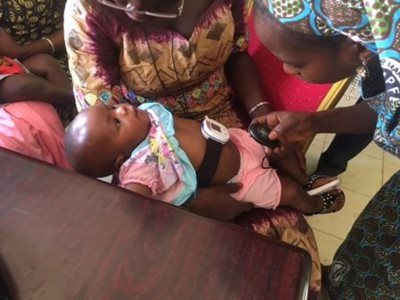Blog post by Mohammad H. Asadi Lari, Youth Advisory Committee member
In many parts of the world, particularly in rural areas, basic health care services are few and far between. Frequently, creative partnerships are needed in order to ensure access to health care, including proper diagnosis and treatment of common illnesses. In these instances, technology, creative thinking and humanitarian partnerships must come together to ensure people receive the best possible care.
This is the case in rural Mali, where long distances and lack of transportation make access to healthcare difficult, especially for mothers and children. In order to remedy this, the Government of Mali set up a Community Health Care Worker (CHW) program in 2009 to provide health care services to populations living five kilometres or more away from the closest primary health care centre. The CHWs receive basic training to assess and treat diseases that pose the biggest threat to children under five: pneumonia, malaria, diarrhea and malnutrition.

The CHWs frequently see children with pneumonia, which in Mali is the number one cause of death for children under the age of five. When pneumonia is suspected, CHWs are required to assess the child’s symptoms and treat them or, if the case is more complicated, send them to the health centre. One of the challenges, however, is that pneumonia can be difficult to diagnose in remote areas, as it requires the CHW to carefully count the child’s breath rate. Thankfully, a device called
ChARM is helping CHWs improve their skills.
ChARM – the Children’s Automated Respiratory Monitor – is a device developed by Phillips, the same company that makes household items such as shavers and light fixtures. It is a small device that wraps around a child’s chest and counts their breath rate. ChARM is being used as part of a project involving the Canadian Red Cross, the Mali Red Cross, the Mali Ministry of Health and the Centre for Global Child Health at the
Hospital for Sick Children in Toronto, who are all working to improve access to health services for women and children in Mali. The ChARM research project is undertaken with the financial support of
Grand Challenges Canada and the Government of Canada, through Global Affairs Canada.
The ChARM device isn’t meant to replace the expertise of the CHWs, but is instead being used as a training tool. When assessing a patient, health workers count the patient’s breaths and check their counting against ChARM’s automated reading, helping improve their own accuracy. Over time, the CHWs will no longer need the device to help confirm their counting, and will be able to better diagnose pneumonia on their own. This also minimizes the need for supervisors and helps CHWs be more efficient in their diagnoses. “Supervision has always been a bottleneck for CHW programs. If ChARM can help CHWs improve their skills on their own, there will be real benefits for everyone involved,” says Mary Thompson, Canadian Red Cross Health Advisor.
“The project is helping empower Community Health Workers in their roles,” says Lindsay Angelow, a Canadian Red Cross Program Officer for West Africa. Lindsay is based in Ottawa, but recently spent six weeks in Bamako, Mali’s capital. “We’re not intending for them to depend on the device forever. The idea is to ultimately improve their ability to detect pneumonia on their own.”
Improved diagnosis of common childhood illnesses such as pneumonia will, in the long run, help reduce the child mortality rate in Mali and other countries that lack basic healthcare services. As community health workers are better equipped to do this work, children will be able to live healthier lives.
Mohammad is an MD/PhD student at the University of Toronto, interested in the intersections of science, technology, social entrepreneurship, policy and health. He’s the Co-Founder and Managing Director of STEM Fellowship, and is on the Board of Apathy is Boring. He’s also served in youth advisory capacities for organizations such as: the CRC, CIHR, CCUNESCO, League of Innovators and Science World BC.